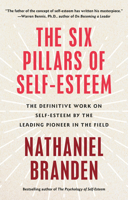Self Esteem: A Proven Program of Cognitive Techniques for Assessing, Improving, and Maintaining Your Self-Esteem
Select Format
Select Condition 
You Might Also Enjoy
Book Overview
Customer Reviews
Rated 5 starsTherapist Approved!
I'm a therapist and I work quite regularly with people who have self-esteem deficits. In fact, I pretty much add self esteem work to every patients treatment plan because of the importance of having a healthy self concept and self esteem. Matthew McKay does a fantastic job in this workbook breaking down some of the larger and more confusing concepts of self esteem as well as organizing them into bite-sized chunks that are...
2Report
Rated 5 starsRead Self-Esteem- It's Worth It
Who's the book for? Anyone who wants to improve their self-esteem. What's the goal of the book? To improve your self-esteem. How does it do this? By showing you how to disarm your "inner critic", you know, that negative inner voice that attacks and judges you. Everyone has one, and people with low self-esteem tend to have a more vicious inner critic. Is it easy to read? Yes, the book is laid out well and written in a...
8Report
Rated 5 starsHighly Recommended
I cannot speak highly enough of this book. I found it to be absolutely invaluable in developing better self esteem. You do need to actually sit down with a pen and paper and do the exercises it suggests, but I found this process really helped me to understand myself and my thinking patterns better. For me, what really opened my eyes was the way the authors explained how the inner critic is reinforced. I feel that this is...
6Report
Rated 5 starsSelf-Esteem: How to get there.
I purchased this book after my therapist shared the chapter on the "Pathological Critic" with me. I have not yet finished the book, but it does recommend that you take it slowly, not rushing through. This book makes a lot of very logical and valid points. The introductory chapter does stress that it's important to actually get out your paper and pencil and DO the exercises. It's the thing we all hate to do the most, but...
5Report
Rated 5 starsOne of the Best Books I've Ever Read on Personal Development
Self Esteem is a practical book. It's about taking control of your thoughts to take control of your feelings. That's all there is to it.With inspiring simplicity and logic, McKay and Fanning educate the reader about the causes and effects of strong self-esteem. It also introduces the Critic - the voice in your head that brings you down no matter what you do. Most importantly, it helps you to expose what psychological needs...
4Report
































































